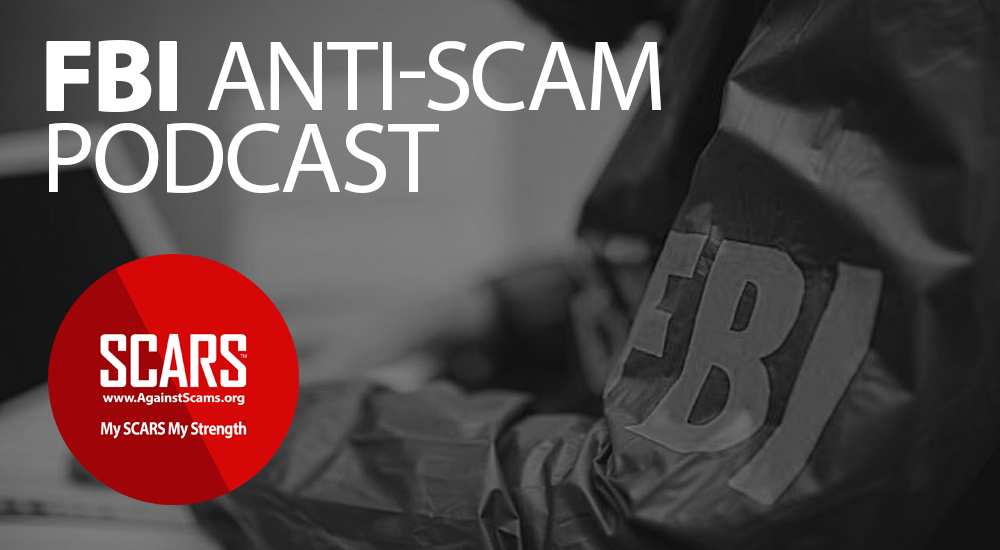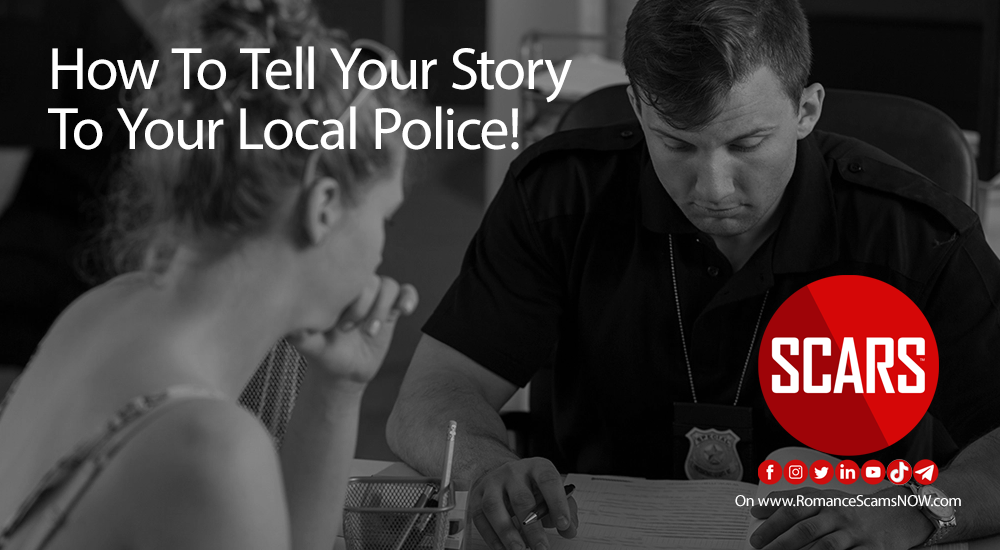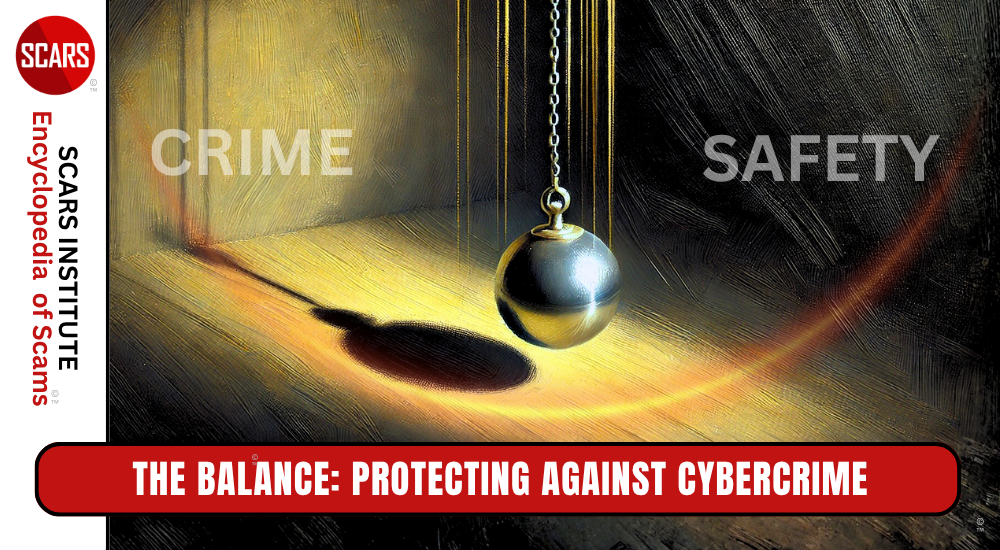
SCARS Institute’s Encyclopedia of Scams™ Published Continuously for 25 Years

Telling The Police – Reporting Scammers
In The Very Beginning, You Must Report This Crime
Telling the local police becomes your first real experience with telling your story by Reporting Scammers.
Reporting Scammers really matters, you are going to be facing another real person and will have to find the courage, clarity, and emotional control to be able to share the details of this crime without breaking down too much. This is not easy.
It begins with your initial preparation of the facts.
REPORTING SCAMMERS – DECIDING WHAT IS IMPORTANT
One of the problems that most victims face is that they do not know what is realistic when initially speaking with the police or government agencies. They also do not know what is important to the police.
After a scam you are shocked and confused, maybe even afraid, so you don’t know how to begin or what to do or say.
Before you talk to the police start collecting the evidence – because that is what it is. It is evidence of a crime, and online crimes are real crimes!
REPORTING SCAMMERS – GETTING ORGANIZED
Before you go further, SCARS Publishes a complete scam victim organizer to help you gather your evidence together – both for yourself and for the police – you can see the SCARS RED BOOK at shop.AgainstScams.org
DIGITAL FOLDER
You will need to create a digital folder on your computer (if you have one.) If this all happened on your phone then you will have to preserve the information in another way.
Save all files and photos into the laptop folder to preserve it for the police if they need it, and also so that it is hidden away and out of your sight so that you are not constantly reminded of the pain. Put everything you can find in there and be as complete as possible.
ON YOUR PHONE
If all you used was your phone, you still need to preserve the important parts. There are tricks that help you preserve information in an out-of-the-way place for later use.
One of those tricks is to send YOURSELF messages – either texts, or on Facebook Messenger – a message from yourself to yourself, and include what you need to keep. Another is to email it to yourself.
PAPER FOLDER
We also recommend that you print what is possible and save it in a paper file folder. This is usually easier to present to the police.
Especially try to print out the receipts for bank and money transfer transactions, since these are the most important for the police to have.
THINGS TO KEEP
You should keep all relevant information about the fraud – it is a crime and the evidence might be needed at some point.
- All hard data – banking, money, email, phone, contact info
- All scammer stories – the chats and the dialog – you can copy from most messengers and put it all in a word or text file- only because there may be some details you missed.
- All transactional documents – documents received from the fraudster, documents for money transactions, other related documents
Photos, videos, media, etc. – if the scammer sent it to you, keep a copy in your folders for potential future use or in reporting.
NOTE: We recommend that you block and cut off all contact with your scammers and any new strangers, but it is important to collect your evidence before you do that – if you can.
CRIME SUMMARY
Before you can start to tell your story, you have to start by collecting all relevant documentation concerning the fraud in one file that is kept in a secure location.
Then summarize the important parts (not all the dialog or chats, but the core facts that the police will need.) You can create this as a digital file or even handwritten on paper – but be neat and organized.
You can use the SCARS RED BOOK specifically designed for this (available on our SCARS Store http://shop.againstscams.org) if you want or do it manually.
CONTACT SHEET
Create a contact sheet of:
- The perpetrator’s (scammer’s) name(s)
- Physical addresses
- Email addresses
- Phone numbers
- Website addresses
- IP addresses
- As well as any of the fraudster’s purported other identification information
- Any others involved: fake lawyer, fake military, fake family – and their contact info
Most victims are not very well organized and it makes it very frustrating for you to tell your story and for the police to understand it.
TIMELINE
A big part of getting your story right is being accurate and precise about your timeline.
Create a timeline of major events, which must span the complete crime from beginning to the present:
- List significant events in the course of the scam – began, discovery, money transfers/gift card purchases
- Your actions – money received, loans taken out, money borrowed
- Any important actions by the scammer(s)
The police will probably not need the transcript of your chats or dialog – it will just get in the way since almost every word was a lie anyway. However, a timeline helps them really understand what happened.
Remember, trauma erases memory, so recreating the timeline will help you to better remember events so you can tell your story.
THE MONEY
The money you lost is a major part of your story.
This is what will have a big impact on you—it is what will cause you to be angry and blame yourself.
Create a summary of the money or finances involved:
- Money you sent to the scammer(s) – receipts, amounts, who sent to, how sent
- Money you may have received from anyone that might be connected – who from, amounts, how received
- Did you give any financial information to the scammers – what?
- Did you give access to banking or other accounts to the scammer? What & where
- Was any money sent to anyone in your same country?
KNOW YOUR RIGHTS
When you tell your story to the police it is important to know that you have rights as a crime victim. Knowing this also helps you direct your story in ways that can help the police support your rights.
You have rights imparted by the government and law. Learn about your rights to better prepare yourself.
For United States federal victim rights (and many other countries have similar laws,) the U.S. Department of Justice provides information on victim rights at https://www.justice.gov/usao/resources/crime-victims-rights-ombudsman
For state victim rights, check with your state Attorney General, whose contact information is available at www.naag.org
If not in the United States do a Google Search for “crime victims’ rights” for your country.
REPORTING SCAMMERS – PREPARING TO GO TO THE POLICE
Before running into the police station and reporting rcammers you need to be prepared or your story will come out wrong.
When this happens you will be frustrated, maybe even angry—angry with the police and yourself.
Before you go and file a criminal complaint with your local police there are things you will need to know to properly set your expectations.
Gather together your evidence and make sure you have your timeline and money records, and the rest of your story is well organized, that is what they will be most interested in.
EXPECTATIONS
Understand that the police will not rush out and go to Nigeria or Ghana and arrest the scammers—no matter how well you tell your story. But that report really matters because only about 1% of victims report these crimes, so governments have no real idea how many of these happen.
They will also, in most cases, not be able to recover your money.
But if you sent money to someone in your country (such as the U.S. you need to make that very clear.)
The police are not interested in all the chats or the things the scammer promised you – they were all lies and of no importance in the crime at this point—even though they are important to you and your story—remember that.
They matter to you, but they are not factual. If the scammer is ever arrested, then they will matter.
Understand that you have only two objectives when going to the police and telling them the version of your story they need to hear:
- Reporting a crime and getting the police report number, since certain benefits come from that
- Regaining control in your life by confronting your fears and doing your duty
When you walk out of the police, you will not have any closure nor specific satisfaction – it just does not work that way – but it is important
YOUR ATTITUDE
When you contact the police, make sure you physically go into their station to make the report.
This is both important for your own psychology and to assure that the report gets taken. Also, it helps the police officers to see you so they can offer some support—maybe not as much as you would like—but they will see you as human.
Do not expect anything from the police – but make sure that when you talk to them you use the word “fraud” and NOT “scam.”
Fraud is a more comfortable term for them and in truth, they are the same thing. Police organizations have 300 years of experience with that term—remember words matter throughout these processes.
They are the first responders and all other reporting will depend on their report first. State or national cybercrime units will receive their reports and become involved if there is something they can do, you also need this report for banking and other places that need the report number, such as for benefits or other services.
Do not go in in a panic, they are not going to save you!
However, if you really are afraid, then be sure to ask the police how to obtain a protection order as well.
DO NOT GO IN ANGRY
If you are hostile to them you will get no results and only be more upset when you leave. They may respond in kind and it makes the whole process even more traumatizing,
Do not try to hide any information!
You have nothing to be ashamed of – you are the victim of a crime.
Do not expect that they will do anything!
Their job is not to leave your town and chase after scammers around the world, but once you have the report number then other doors open for you.
SUPPORT
Ask a friend or family member to go with you, but be sure they understand that this is your story and to let you do all the talking.
You do not have to tell them much in advance (the friend), just that you were scammed. But having someone with you will help you make it through this and support you afterward.
TALKING WITH THE POLICE – FILING THE REPORT
First, understand that very few police understand relationship scams – they may not be able to understand how the manipulation works and they may think you are mostly to blame – that does not matter.
You are there for ONE PURPOSE – to tell them your story and file a report, because that report matters!
When you go in, tell them you want to file a complaint for fraud, and ask if you can speak with a fraud detective (if possible.)
If you are a woman, you can also ask to speak with a woman detective.
MAKE SURE: You get the name and badge number of the officer that takes the report – write it down.
They will likely give you a form to fill in, or they may take the report orally. Be sure you start with just the basics:
You were defrauded – You lost money – tell them how much and how it was sent
You have information – ask them what they would like to know
If you sent money to someone in your own country (such as a mule) tell them that clearly, and that you suspect it was an “accomplice”
Give them any information they ask for, no matter how embarrassing – you have nothing to be ashamed of and you are not to blame.
This is your story, tell it with pride!
Next, before you leave, ask them to refer the case to the state or national cybercrime unit – every state in the U.S. has one, most countries have one too.
MAKE SURE: you do not leave without getting a report number.
If the officer objects to taking a report, ask to speak with the “Watch Commander,” Police Chief, or Sherriff. Do not accept no for an answer – but do not be hostile or nothing will happen for you.
ATTITUDE IS EVERYTHING
If they give you attitude, then just say “Imagine if this was your mother sitting here, would you treat her this way?”
If they object, tell them you need it for your insurance and your taxes – your accountant and bank need it too. The police routinely take “informational” police reports for this purpose.
MAKE SURE: You ask if there is a victims’ advocate or liaison officer on staff that you can talk to – they know how to access local government benefits and other assistance you might need and they know how to help you tell your story effectively. Domestic Abuse advocates understand trauma and can help you also.
Then leave.
THE AFTERMATH
After this is all done, know that you did a very brave thing and you told your story!
This was probably the first time you did this, but it will not be the last. Telling your story takes away a little more pain each time you tell it.
Be proud of yourself—telling your story the first time is hard and even harder to tell it to the police.
If you do it, you will be stronger.
You took one giant step forward. Now focus on getting on with your recovery.
Just remember, you will tell this story again.
– – – – – – – – – – – – – – – – – – – – –
From the upcoming SCARS Gold Book – copyright © 2022 SCARS
This article is by:
SCARS™ – Society of Citizens Against Relationship Scams Inc.
A scams & financial fraud crime victims assistance & crime prevention nonprofit organization headquartered in Miami Florida USA & Monterrey NL Mexico, with partners in more than 60 countries worldwide
If you are a Victim sign up for our FREE SCARS Support Groups at support.AgainstScams.org
To learn more about SCARS, or to Join, Volunteer, or Donate visit: AgainstScams.org
To see Scammer Photos visit www.ScammerPhotos.com
Contact Us: Contact@AgainstScams.org
-/ 30 /-
What do you think about this?
Please share your thoughts in a comment below!
Table of Contents
- Reporting Scammers & Surviving The Reporting Process
- Telling The Police – Reporting Scammers
- In The Very Beginning, You Must Report This Crime
- REPORTING SCAMMERS – DECIDING WHAT IS IMPORTANT
- REPORTING SCAMMERS – GETTING ORGANIZED
- REPORTING SCAMMERS – PREPARING TO GO TO THE POLICE
- TALKING WITH THE POLICE – FILING THE REPORT
- THE AFTERMATH
LEAVE A COMMENT?
Thank you for your comment. You may receive an email to follow up. We never share your data with marketers.
Recent Comments
On Other Articles
- on Love Bombing And How Romance Scam Victims Are Forced To Feel: “I was love bombed to the point that I would do just about anything for the scammer(s). I was told…” Feb 11, 14:24
- on Dani Daniels (Kira Lee Orsag): Another Scammer’s Favorite: “You provide a valuable service! I wish more people knew about it!” Feb 10, 15:05
- on Danielle Delaunay/Danielle Genevieve – Stolen Identity/Stolen Photos – Impersonation Victim UPDATED 2024: “We highly recommend that you simply turn away form the scam and scammers, and focus on the development of a…” Feb 4, 19:47
- on The Art Of Deception: The Fundamental Principals Of Successful Deceptions – 2024: “I experienced many of the deceptive tactics that romance scammers use. I was told various stories of hardship and why…” Feb 4, 15:27
- on Danielle Delaunay/Danielle Genevieve – Stolen Identity/Stolen Photos – Impersonation Victim UPDATED 2024: “Yes, I’m in that exact situation also. “Danielle” has seriously scammed me for 3 years now. “She” (he) doesn’t know…” Feb 4, 14:58
- on An Essay on Justice and Money Recovery – 2026: “you are so right I accidentally clicked on online justice I signed an agreement for 12k upfront but cd only…” Feb 3, 08:16
- on The SCARS Institute Top 50 Celebrity Impersonation Scams – 2025: “Quora has had visits from scammers pretending to be Keanu Reeves and Paul McCartney in 2025 and 2026.” Jan 27, 17:45
- on Scam Victims Should Limit Their Exposure To Scam News & Scammer Photos: “I used to look at scammers photos all the time; however, I don’t feel the need to do it anymore.…” Jan 26, 23:19
- on After A Scam, No One Can Tell You How You Will React: “This article was very informative, my scams happened 5 years ago; however, l do remember several of those emotions and/or…” Jan 23, 17:17
- on Situational Awareness and How Trauma Makes Scam Victims Less Safe – 2024: “I need to be more observant and I am practicing situational awareness. I’m saving this article to remind me of…” Jan 21, 22:55
ARTICLE META
Important Information for New Scam Victims
- Please visit www.ScamVictimsSupport.org – a SCARS Website for New Scam Victims & Sextortion Victims
- Enroll in FREE SCARS Scam Survivor’s School now at www.SCARSeducation.org
- Please visit www.ScamPsychology.org – to more fully understand the psychological concepts involved in scams and scam victim recovery
If you are looking for local trauma counselors please visit counseling.AgainstScams.org or join SCARS for our counseling/therapy benefit: membership.AgainstScams.org
If you need to speak with someone now, you can dial 988 or find phone numbers for crisis hotlines all around the world here: www.opencounseling.com/suicide-hotlines
A Note About Labeling!
We often use the term ‘scam victim’ in our articles, but this is a convenience to help those searching for information in search engines like Google. It is just a convenience and has no deeper meaning. If you have come through such an experience, YOU are a Survivor! It was not your fault. You are not alone! Axios!
A Question of Trust
At the SCARS Institute, we invite you to do your own research on the topics we speak about and publish, Our team investigates the subject being discussed, especially when it comes to understanding the scam victims-survivors experience. You can do Google searches but in many cases, you will have to wade through scientific papers and studies. However, remember that biases and perspectives matter and influence the outcome. Regardless, we encourage you to explore these topics as thoroughly as you can for your own awareness.
Statement About Victim Blaming
SCARS Institute articles examine different aspects of the scam victim experience, as well as those who may have been secondary victims. This work focuses on understanding victimization through the science of victimology, including common psychological and behavioral responses. The purpose is to help victims and survivors understand why these crimes occurred, reduce shame and self-blame, strengthen recovery programs and victim opportunities, and lower the risk of future victimization.
At times, these discussions may sound uncomfortable, overwhelming, or may be mistaken for blame. They are not. Scam victims are never blamed. Our goal is to explain the mechanisms of deception and the human responses that scammers exploit, and the processes that occur after the scam ends, so victims can better understand what happened to them and why it felt convincing at the time, and what the path looks like going forward.
Articles that address the psychology, neurology, physiology, and other characteristics of scams and the victim experience recognize that all people share cognitive and emotional traits that can be manipulated under the right conditions. These characteristics are not flaws. They are normal human functions that criminals deliberately exploit. Victims typically have little awareness of these mechanisms while a scam is unfolding and a very limited ability to control them. Awareness often comes only after the harm has occurred.
By explaining these processes, these articles help victims make sense of their experiences, understand common post-scam reactions, and identify ways to protect themselves moving forward. This knowledge supports recovery by replacing confusion and self-blame with clarity, context, and self-compassion.
Additional educational material on these topics is available at ScamPsychology.org – ScamsNOW.com and other SCARS Institute websites.
Psychology Disclaimer:
All articles about psychology and the human brain on this website are for information & education only
The information provided in this article is intended for educational and self-help purposes only and should not be construed as a substitute for professional therapy or counseling.
While any self-help techniques outlined herein may be beneficial for scam victims seeking to recover from their experience and move towards recovery, it is important to consult with a qualified mental health professional before initiating any course of action. Each individual’s experience and needs are unique, and what works for one person may not be suitable for another.
Additionally, any approach may not be appropriate for individuals with certain pre-existing mental health conditions or trauma histories. It is advisable to seek guidance from a licensed therapist or counselor who can provide personalized support, guidance, and treatment tailored to your specific needs.
If you are experiencing significant distress or emotional difficulties related to a scam or other traumatic event, please consult your doctor or mental health provider for appropriate care and support.
Also read our SCARS Institute Statement about Professional Care for Scam Victims – click here to go to our ScamsNOW.com website.

















My local police were empathetic but seemed inexperienced dealing with internet fraud. I doubt they are going to be very helpful.
Last year, I filed a report for Romance Scam/Fraud/Financial Exploitation/Deception with my local police office, FTC, FBI, US Postal Service, IC3 and the Attorney General.
After listening to the “how to report to the police” webinar and reading this article, I have one question; Would it be recommended, in my case, to purchase the red book and document the crime, or at this point is not necessary?
Really I wished I knew about this option when I had to put together my story and evidence.
Properly documenting the crime is always important. You might have to be a witness, you might need it for an action against a mule, you might need it for a change in taxation, it would also be helpful if you ever give an interview. We publish the RED BOOK because it helps organized the crime information in a way not easy achieved otherwise. However, while we recommend it, it is always your decision. Visit https://shop.AgainstScams.org to purchase a copy.